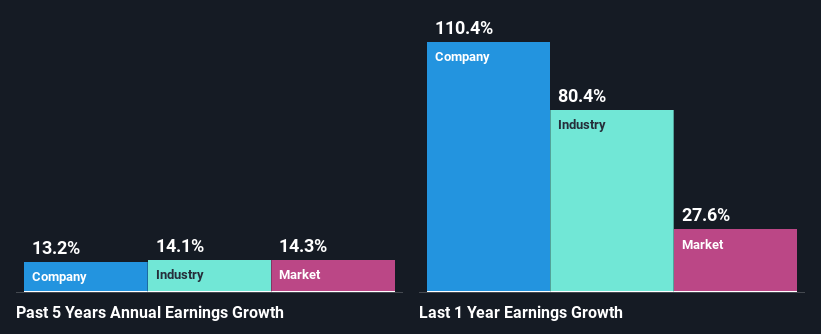Is Rush Enterprises, Inc.'s (NASDAQ:RUSH.B) Latest Stock Performance A Reflection Of Its Financial Health?
Rush Enterprises (NASDAQ:RUSH.B) has had a great run on the share market with its stock up by a significant 10% over the last month. Given that the market rewards strong financials in the long-term, we wonder if that is the case in this instance. Particularly, we will be paying attention to Rush Enterprises' ROE today.
Return on equity or ROE is a key measure used to assess how efficiently a company's management is utilizing the company's capital. In simpler terms, it measures the profitability of a company in relation to shareholder's equity.
Check out our latest analysis for Rush Enterprises
How Do You Calculate Return On Equity?
The formula for ROE is:
Return on Equity = Net Profit (from continuing operations) ÷ Shareholders' Equity
So, based on the above formula, the ROE for Rush Enterprises is:
19% = US$289m ÷ US$1.5b (Based on the trailing twelve months to March 2022).
The 'return' is the yearly profit. So, this means that for every $1 of its shareholder's investments, the company generates a profit of $0.19.
What Has ROE Got To Do With Earnings Growth?
So far, we've learned that ROE is a measure of a company's profitability. Depending on how much of these profits the company reinvests or "retains", and how effectively it does so, we are then able to assess a company’s earnings growth potential. Generally speaking, other things being equal, firms with a high return on equity and profit retention, have a higher growth rate than firms that don’t share these attributes.
Rush Enterprises' Earnings Growth And 19% ROE
At first glance, Rush Enterprises seems to have a decent ROE. And on comparing with the industry, we found that the the average industry ROE is similar at 23%. This probably goes some way in explaining Rush Enterprises' moderate 13% growth over the past five years amongst other factors.
Next, on comparing Rush Enterprises' net income growth with the industry, we found that the company's reported growth is similar to the industry average growth rate of 14% in the same period.
Earnings growth is an important metric to consider when valuing a stock. It’s important for an investor to know whether the market has priced in the company's expected earnings growth (or decline). By doing so, they will have an idea if the stock is headed into clear blue waters or if swampy waters await. If you're wondering about Rush Enterprises''s valuation, check out this gauge of its price-to-earnings ratio, as compared to its industry.
Is Rush Enterprises Using Its Retained Earnings Effectively?
Rush Enterprises' three-year median payout ratio to shareholders is 17% (implying that it retains 83% of its income), which is on the lower side, so it seems like the management is reinvesting profits heavily to grow its business.
Moreover, Rush Enterprises is determined to keep sharing its profits with shareholders which we infer from its long history of four years of paying a dividend.
Conclusion
In total, we are pretty happy with Rush Enterprises' performance. In particular, it's great to see that the company is investing heavily into its business and along with a high rate of return, that has resulted in a sizeable growth in its earnings. That being so, according to the latest industry analyst forecasts, the company's earnings are expected to shrink in the future. Are these analysts expectations based on the broad expectations for the industry, or on the company's fundamentals? Click here to be taken to our analyst's forecasts page for the company.
Have feedback on this article? Concerned about the content? Get in touch with us directly. Alternatively, email editorial-team (at) simplywallst.com.
This article by Simply Wall St is general in nature. We provide commentary based on historical data and analyst forecasts only using an unbiased methodology and our articles are not intended to be financial advice. It does not constitute a recommendation to buy or sell any stock, and does not take account of your objectives, or your financial situation. We aim to bring you long-term focused analysis driven by fundamental data. Note that our analysis may not factor in the latest price-sensitive company announcements or qualitative material. Simply Wall St has no position in any stocks mentioned.

